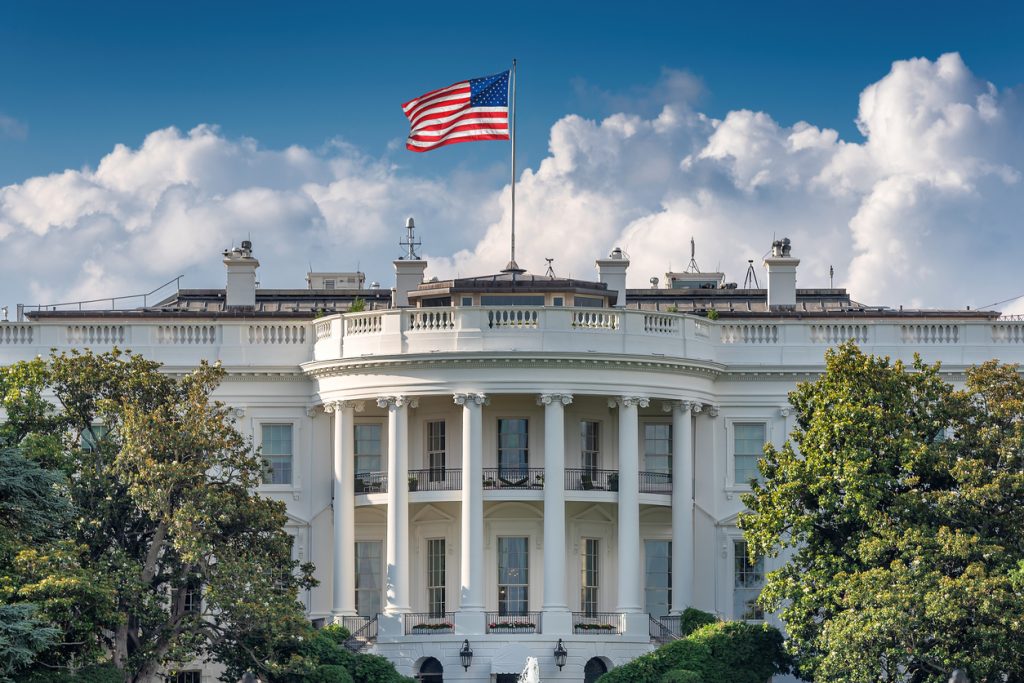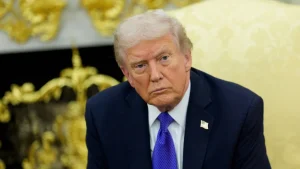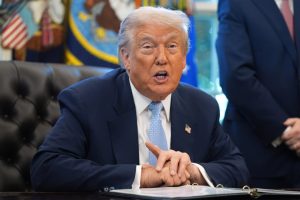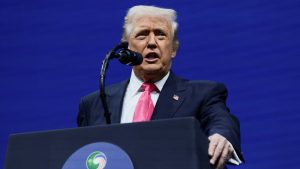Such charges are unprecedented. However, Trump is far from the first president to have been accused of a crime. Throughout its 200-year history, several presidents have become embroiled in legal troubles either during or before their tenure in office. From impeachment proceedings for lying to Congress to an arrest for speeding in a horse-drawn buggy, each has made a marked a ‘first’ in the country’s legal record books in one way or another.
Andrew Johnson
Trump was impeached twice during his presidency, first over an apparent threat to withhold aid to Ukraine to secure advantages against then-presidential hopeful Joe Biden, and again over his actions in the lead-up to the January 6 attack on the US Capitol. However, Trump is only the second president to have been “impeached of high crimes and misdemeanours in office”. The first was 17th President of the United States Andrew Johnson, who inherited a political powder keg in the aftermath of the Civil War and the assassination of predecessor Abraham Lincoln.
Johnson frequently clashed with the so-called ‘radical Republicans’ of the era, who wanted to implement stringent conditions on seceded states’ readmission to the Union. Johnson’s policies were more lenient towards the South, and he repeatedly blocked the enforcement of the Reconstruction Acts, which had been passed to provide suffrage to freed slaves and prevent former Southern rebels from regaining control of their state governments. The clash came to a head in 1867 following the passage of the Tenure of Office Act, which made it impossible for the president to dismiss important government officials without Senatorial permission – and which Johnson defied in his subsequent dismissal of radical-sympathetic Secretary of War Edwin M Stanton in 1968.
When Congress reconvened, Stanton’s suspension was overruled and the House of Representatives formally impeached Johnson by a vote of 126 to 47. Johnson was charged with violation of the Tenure of Office Act and bringing into “disgrace, ridicule, hatred, contempt, and reproach the Congress of the United States”. However, the president’s political fortunes changed during the 11-week trial that followed, gaining enough credit among the senators that he escaped removal from office by one vote. Johnson passed the rest of his term unremarkably and was succeeded by radical-favoured candidate Ulysses S Grant later that year.
Bill Clinton
The last president who came close to facing criminal charges while in office, Clinton’s tenure was marred by a scandal originating before he took up residence in the West Wing. Receptionist Paula Jones claimed to have suffered emotional damage in May 1991 after Clinton, then-Governor of Arkansas, exposed himself to her in a hotel room, suing for sexual harassment.
The Clinton v Jones suit was influential in establishing a precedent that a sitting president might be sued for actions taken prior to being elected. Moreover, it brought to light other instances of improper behaviour by Clinton, including a two-year relationship with White House intern Monica Lewinsky. This would become the defining scandal of Clinton’s presidency, as his Clinton v Jones testimony denying the affair was used as grounds for his impeachment by the House, who accused him of lying under oath and obstruction of justice.
The Clinton v Jones suit was influential in establishing a precedent that a sitting president might be sued for actions taken prior to being elected.
Clinton eventually reached an out-of-court settlement with Jones in November 1998 which saw the president paying $850,000 in civil damages while admitting no wrongdoing. With neither article of impeachment gaining the required two-thirds majority, he was not convicted in his impeachment trial, yet the sex scandals would become an enduring legacy of his time in office.
Ulysses S Grant
To date, only two presidents (current or former) have been arrested. The most recent of them is Trump, but Andrew Johnson successor Ulysses S Grant had the dubious honour of becoming the very first. It is a matter of historical record that Grant faced at least two confrontations with the law, which occurred within months of each other in 1866 while he was a lieutenant general. The National Intelligencer reported that, while “exercising his fast gray nag” on 14th Street in Washington, DC, the general was detained by two MPD officers for speeding. Grant offered to pay the fine, but “expressed his doubts of their authority to arrest him" and drove away – before later acknowledging his warrant and paying in full. Later that year, Grant was arrested again on speeding charges and again paid his fine.
According to some historians, a third incident occurred in 1872 during Grant’s tenure as president, during which he was apprehended by African American MPD officer William H West for driving his horse-drawn buggy at speed. Then the 18th President of the United States, it is claimed that Grant not only encouraged West to arrest him, but insisted that he not face punishment for doing his duty. The incident was noteworthy not only for being the first arrest of a president, sitting or otherwise, but also for the arresting officer having been an African American – and occurring during the height of the Reconstruction era.
Richard Nixon
President Nixon is cited by many as the closest analogue to Trump in terms of the seriousness of his flagship scandal. In 1974, Nixon made history as the first president to resign the position, having been widely disgraced for his participation in the cover-up of the 1972 burglaries and wiretapping of a Democratic National Committee headquarters in the Watergate complex in a bid to boost his re-election odds. His resignation came under the imminent promise of impeachment and followed the indictment or jailing of 40 federal officials, including his own chief of staff, chief domestic advisor, White House attorney and attorney general.
[ymal]
Of particular note is the detail that Nixon was named an ‘unindicted co-conspirator’ by a federal grand jury – a term that will also be familiar to those who have followed the January 6 investigations. The decision to declare Nixon as such stemmed from an opinion from the Justice Department's Office of Legal Counsel in 1973, which held that a sitting president could not be indicted. Less clear was whether Nixon might be charged after leaving office – a matter that his successor, Gerald Ford, sidestepped by issuing him a presidential pardon.
To date, the question has never been tried in a court of law. But with Trump now polling as the most likely candidate to become Republican nominee for president in 2024, there is a non-zero chance that it may be revisited in the near future.





















